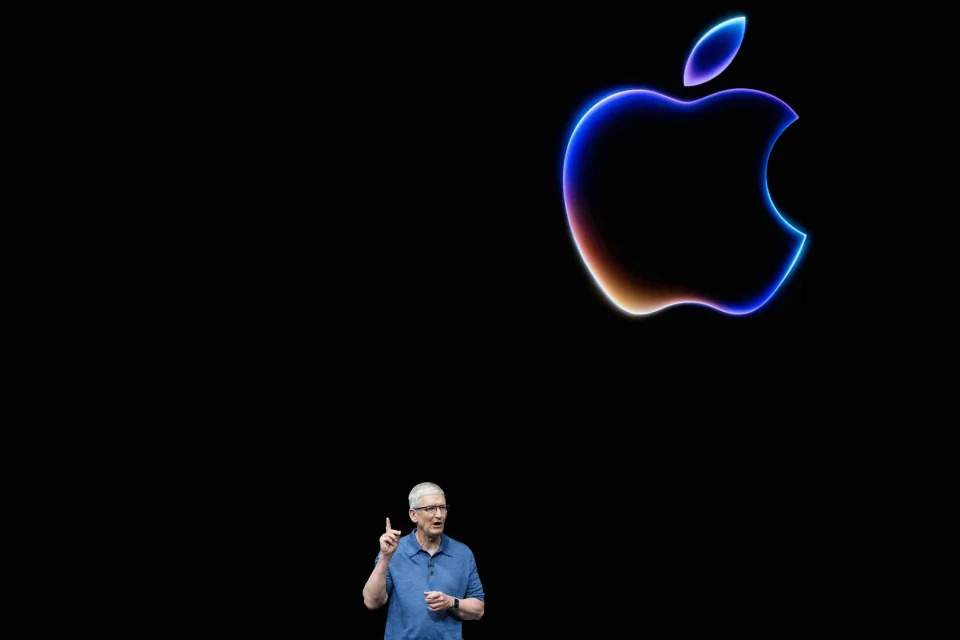Apple ( AAPL ) will host its annual iPhone launch event on Monday, Sept. 9, at its headquarters in Cupertino, Calif.
CEO Tim Cook is expected to headline the keynote, which will reportedly include the debut of the iPhone 16 lineup, the 10th anniversary edition of the Apple Watch, and updated AirPods.
That’s a lot of hardware, but Wall Street isn’t banking on new iPhones or special edition Apple Watches to move the company’s stock price. Instead, all eyes will be on Apple’s generative AI-powered Apple Intelligence platform.
Apple Intelligence is the company’s big swing at bringing generative AI capabilities to consumers’ iPhones, iPads, and Macs. Wall Street wasn’t very keen on how long it took Apple to announce its AI initiative, waiting impatiently as Microsoft ( MSFT ) and Google ( GOOG , GOOGL ) debuted their own AI services for enterprises and consumers.
But investors changed their tune when Apple showed off Apple Intelligence at its WWDC developer conference in June, sending the company’s stock price up around 15% and putting it ahead of Microsoft, Amazon, Tesla, and Google for year-to-date performance.
Apple is setting up Apple Intelligence as one of the main selling points for its latest phones, as its software will only run on last year’s iPhone 15 Pro or newer phones. And analysts are banking on that exclusivity to reinvigorate iPhone sales.
“Apple Intelligence remains the key to unlocking pent-up iPhone demand and accelerating replacement cycle, and we expect Apple's… event to heavily feature AI integration on the new iPhone 16,” Morgan Stanley analyst Erik Woodring wrote in an investor note.
But Apple Intelligence could prove to be something more important than a catalyst for iPhone sales. It will also serve as a make-or-break moment for generative AI in the eyes of everyday consumers.
Apple’s AI opportunity
Take one look at Apple’s invitation for its Sept. 9 show, and it’s clear the company is going all in on AI. From the “It’s Glowtime” tagline to the multicolor Apple logo meant to evoke Siri’s revamped look, the company is sending the message that this show will be an AI showcase.
Apple is pouring AI into its software products with features that summarize text message threads, surface priority emails in the Mail app, provide an improved Siri experience, and enable access to OpenAI’s ChatGPT.
Apple is also including AI staples like writing tools to help gussy up your emails and documents by proofreading your text or reworking it to sound more professional or concise. The company is also expecting developers to jump on board the AI train, building out new apps that take advantage of the technology through Apple’s devices.
“We estimate this could result in incremental Services high margin growth annually of $10 billion for Apple as this all kicks in and will be the start of a new multi-pronged AI revenue stream that is both hardware and software driven,” Wedbush analyst Dan Ives wrote in an investor note.
“We believe AI technology being introduced into the Apple ecosystem will bring monetization opportunities on both the services as well as iPhone/hardware front,” Ives added. And with that, a $30 to $40 per share bump — pushing the company’s market cap to the $4 trillion mark.
Apple isn’t the only company to bring generative AI to its smartphone line. Samsung has Galaxy AI software, combining its own AI with some of Google’s AI smarts. Google also offers its own Gemini AI platform via its new Pixel 9 line of devices, including its Pixel 9 Pro Fold foldable phone.
Apple, however, has done a far better job explaining its AI offerings than either of its competitors. It made the software seem like a must-have for users during its June developer conference, explaining how it integrates across the company’s various apps and services in a way that Samsung and Google haven’t been able to by making AI seem more personal .
The AI risk
But Apple is going to have to do more than that to get people excited about its AI efforts. I’ve been using Apple’s beta software on my iPhone 15 Pro Max, and while I appreciate its ability to summarize long text message threads between friends — no one likes having to sift through 40 messages to find out what they’re doing for dinner — and find the priority email feature in Mail helpful, it’s difficult to say whether that will be enough to spark consumer interest in the technology.
Apple will also need to take great care to ensure that its Apple Intelligence is accurate and not prone to the kinds of hallucinations that have led to criticisms of AI software like Google’s AI Overview, which famously told people to add glue to their pizza and to eat rocks .
Above all, Apple will need to ensure that Apple Intelligence is something that consumers actually want to use and not a feature the company had to shoehorn into its portfolio to placate investors fearing Apple would miss the boat on the next tech hype train.
@DanielHowley .
For the latest earnings reports and analysis, earnings whispers and expectations, and company earnings news, click here
Read the latest financial and business news from Yahoo Fin ance.


